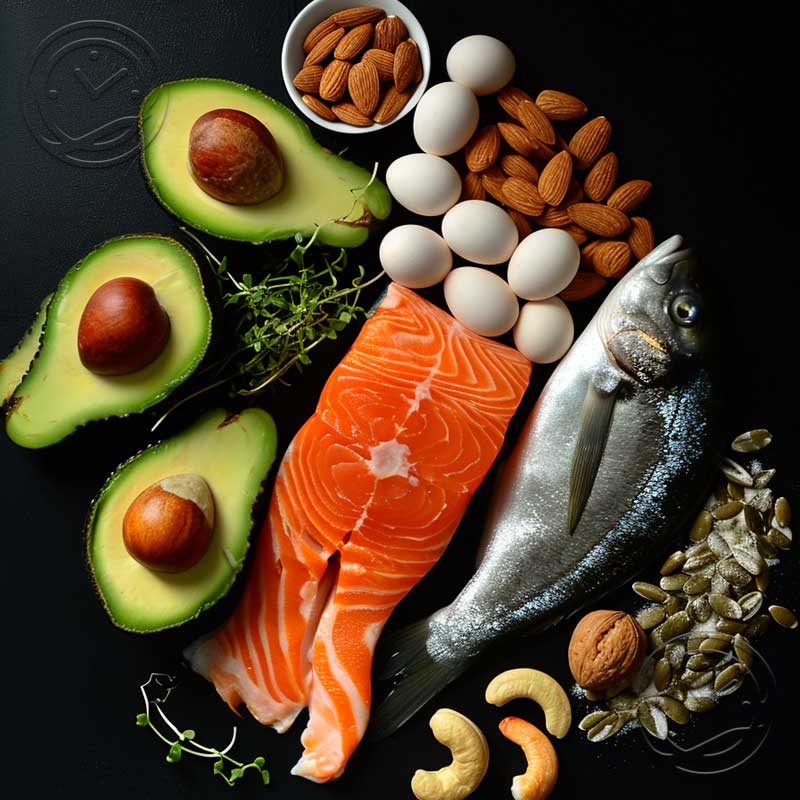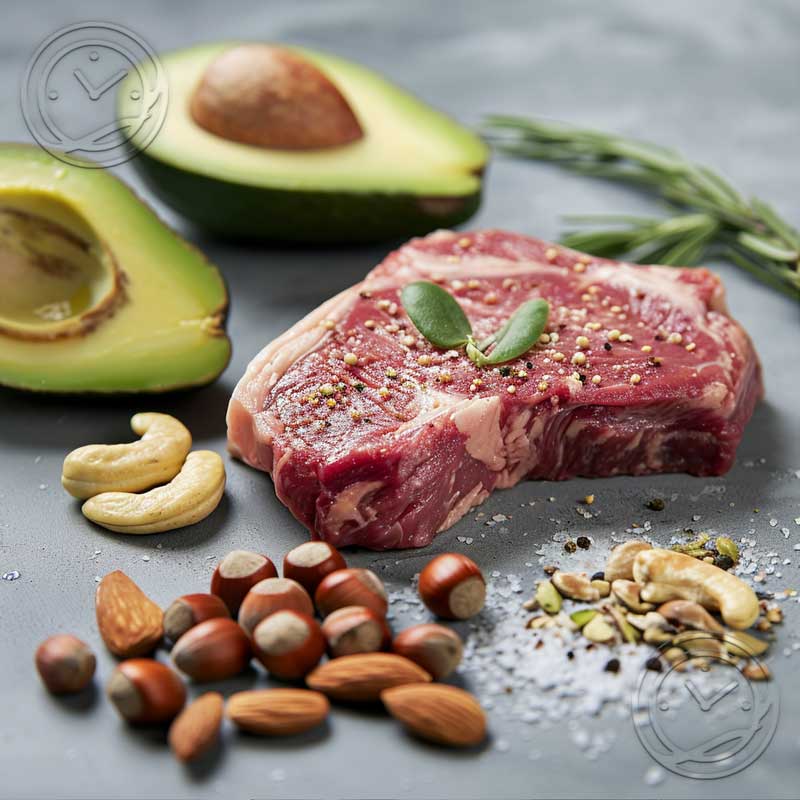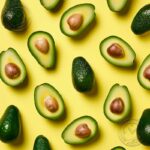Micronutrients in the Keto Diet
Micronutrients are essential nutrients that the body needs in small amounts to function properly. They include vitamins, minerals, and other substances such as choline and chromium. Micronutrients are not produced by the body, so they must be obtained from food or supplements.
The keto diet is a low-carb, high-fat diet that has been shown to have a number of health benefits, including weight loss, improved blood sugar control, and reduced risk of heart disease. However, the keto diet can also lead to micronutrient deficiencies if it is not properly planned.
In this article, we will discuss the importance of micronutrients on the keto diet, the specific micronutrients that are deficient on the keto diet, and how to get enough micronutrients on the keto diet.
The Importance of Micronutrients
Micronutrients are essential nutrients that your body needs in small amounts to function properly. They include vitamins, minerals, and other essential elements. Micronutrients play a variety of important roles in your body, including:
- Producing energy
- Building bones and teeth
- Maintaining a healthy immune system
- Protecting against chronic diseases
When you follow a keto diet, it is important to make sure that you are getting enough of the essential micronutrients. This can be challenging, as many keto-friendly foods are low in micronutrients. However, there are a number of ways to ensure that you are getting the nutrients you need on a keto diet.
Here are some tips for getting enough micronutrients on a keto diet:
- Eat a variety of keto-friendly foods.
- Take a multivitamin or mineral supplement.
- Talk to your doctor about your individual needs.
By following these tips, you can ensure that you are getting the essential micronutrients you need to stay healthy on a keto diet.
Are you looking for a way to lose weight quickly and easily? If so, then you may want to consider…
Micronutrients Deficiencies on the Keto Diet
The keto diet is a high-fat, low-carb diet that has been shown to have many health benefits. However, it is important to note that the keto diet can also lead to some micronutrient deficiencies.
Some of the most common micronutrient deficiencies on the keto diet include:
- Choline
- Chromium
- Copper
- Folate
- Iodine
- Iron
- Magnesium
- Manganese
- Molybdenum
- Niacin
- Pantothenic acid
- Phosphorus
- Potassium
- Selenium
- Sodium
- Vitamin A
- Vitamin B12
- Vitamin C
- Vitamin D
- Vitamin E
- Vitamin K
These deficiencies can occur because the keto diet is low in certain foods that are rich in these nutrients. For example, the keto diet is low in fruits and vegetables, which are good sources of vitamins, minerals, and fiber.
In addition, the keto diet can also lead to dehydration, which can further increase the risk of micronutrient deficiencies.
If you are following the keto diet, it is important to be aware of the potential for micronutrient deficiencies and to take steps to prevent them.
Here are some tips for preventing micronutrient deficiencies on the keto diet:
- Eat a variety of foods, including plenty of fruits, vegetables, and low-carb protein sources.
- Take a multivitamin and mineral supplement to ensure that you are getting all of the nutrients that you need.
- Drink plenty of fluids to avoid dehydration.
- Work with your doctor or a registered dietitian to monitor your nutrient levels and to make sure that you are getting all of the nutrients that you need.
By following these tips, you can help to prevent micronutrient deficiencies on the keto diet and stay healthy.
How to Get Enough
There are a few ways to get enough micronutrients on the keto diet.
First, eat a variety of whole foods. This will ensure that you are getting a wide range of nutrients.
Second, focus on eating nutrient-dense foods. These are foods that are high in nutrients but low in calories.
Third, supplement with micronutrients if necessary. This is especially important if you are following a strict keto diet or if you have a history of nutrient deficiencies.
Here are some specific tips for getting enough micronutrients on the keto diet:
- Eat plenty of dark leafy greens, such as spinach, kale, and collard greens.
- Include cruciferous vegetables, such as broccoli, cauliflower, and Brussels sprouts, in your diet.
- Eat plenty of fruits, such as berries, oranges, and avocados.
- Choose whole grains, such as brown rice, quinoa, and oats, over refined grains.
- Consume plenty of nuts and seeds, such as almonds, walnuts, and chia seeds.
- Add healthy fats to your diet, such as olive oil, avocado oil, and coconut oil.
If you are concerned about getting enough micronutrients on the keto diet, talk to your doctor or a registered dietitian. They can help you create a personalized plan to ensure that you are getting the nutrients you need.

Unlock the secrets of the keto diet! Discover how this unique approach to eating can lead to efficient fat burning,…
Foods High in Micronutrients
The following foods are good sources of micronutrients on the keto diet:
- Meat and poultry: beef, pork, lamb, chicken, turkey
- Fish and seafood: salmon, tuna, mackerel, sardines, shrimp, lobster
- Eggs
- Dairy products: milk, cheese, yogurt
- Nuts and seeds: almonds, walnuts, pecans, chia seeds, flax seeds
- Leafy green vegetables: spinach, kale, collard greens, Swiss chard
- Other vegetables: broccoli, cauliflower, Brussels sprouts, tomatoes, cucumbers
- Fruits: berries, oranges, grapefruit, lemons, limes
- Whole grains: quinoa, oats, brown rice
- Healthy fats: olive oil, avocado oil, coconut oil
By eating a variety of these foods, you can ensure that you are getting the micronutrients that you need to stay healthy on the keto diet.
Supplements
In addition to eating a diet rich in micronutrient-rich foods, you may also need to take supplements to ensure that you are getting enough of the nutrients that you need. The following are some of the most common supplements that are recommended for people on the keto diet:
- Magnesium
- Sodium
- Potassium
- Calcium
- Iron
- Iodine
- Vitamin D
- Vitamin B12
It is important to talk to your doctor before taking any supplements, as some supplements can interact with medications or other health conditions.
Omega-3 Fatty Acids for Vegetarians
Unlock the secrets to a healthier vegetarian lifestyle with our comprehensive guide to Omega-3 Fatty Acids. Discover the vital role…
Tips for Avoiding Micronutrient Deficiencies
Here are some tips for avoiding micronutrient deficiencies on the keto diet:
- Eat a variety of whole foods. This will help you to ensure that you are getting a wide range of nutrients.
- Focus on nutrient-dense foods. These are foods that are high in nutrients but low in calories.
- Supplement with electrolytes. Keto dieters often lose electrolytes through sweat and urine. It is important to replace these electrolytes to avoid dehydration and other health problems.
- Take a multivitamin. A multivitamin can help to ensure that you are getting all of the essential vitamins and minerals that you need.
- Work with a qualified healthcare professional. A healthcare professional can help you to create a personalized nutrition plan that is tailored to your individual needs.
By following these tips, you can help to reduce your risk of developing micronutrient deficiencies on the keto diet.
Conclusion
In conclusion, micronutrients are essential for good health, and it is important to make sure that you are getting enough of them on the keto diet.
Some of the best ways to get enough micronutrients on the keto diet include eating a variety of whole foods, taking supplements, and working with a qualified healthcare professional.
By following these tips, you can ensure that you are getting the nutrients you need to stay healthy and well on the keto diet.






